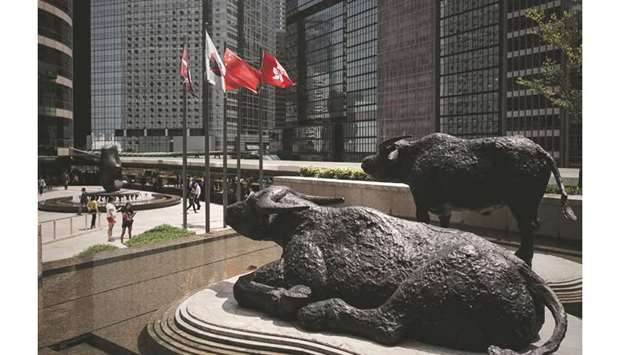Asian investors extended a sell-off in global markets yesterday after Donald Trump poured cold water on the chances of a trade deal with China by the end of the year.
After weeks of broad optimism — and White House claims — that the economic superpowers were close to a partial agreement, the president said he could be happy to wait until after next year’s elections.
The comments, in London ahead of a tense Nato summit that has also fuelled geopolitical concerns, sent shivers through trading floors across Europe and New York, where dealers ran for the hills.
“I have no deadline,” Trump told reporters upon his arrival. “In some ways, I like the idea of waiting until after the election for the China deal.”
Investors were already on edge after the US reimposed stiff tariffs on Argentina and Brazil citing currency manipulation, then threatened to hammer France with 100% levies over the country’s digital tax.
US Commerce Secretary Wilbur Ross had also warned that more tariffs on Chinese goods planned for December 15 would be imposed if the first phase of trade talks was not completed by then.
Observers noted that Trump has in the past made statements on the issue that he has soon rowed back on, but there is a growing concern that the next round of China levies will be imposed.
A US House of Representatives vote to toughen the US position against China over its treatment of minority Uighurs, calling for sanctions against senior officials, will likely further complicate matters.
Beijing said yesterday the bill “wantonly smears” it and that a “price must be paid” by the US.
The vote comes days after China announced retaliatory measures for Trump’s decision to sign a bill supporting Hong Kong democracy protests.
“While the trade mood music can change very quickly, events over the past 48 hours have forced a reassessment in terms of what to expect before the end of the year,” said Rodrigo Catril at National Australia Bank.
“Tariff man is back and he has brought market volatility back to life.”
Markets were down across the board in Asia on Wednesday.
Hong Kong, Tokyo and Sydney all lost more than 1%, while Shanghai, Mumbai, Taipei and Bangkok each shed 0.2%. Singapore dropped 0.6%, Seoul fell 0.7%, Manila slipped 1% and Jakarta sank 0.5%. In early trade London fell 0.2% but Frankfurt rose 0.2% while Paris gained 0.1%.
“It’s very difficult to have conviction about which way the trade situation will go,” Laura Kane at UBS Global Wealth Management told Bloomberg TV.
“Just a few weeks ago the news was incrementally positive, now we’ve moved more negative again, but the situation is going to stay in flux as we enter next year.”
Michael Hewson, chief market analyst at CMC Markets UK, added: “It should of course be noted that sentiment could well stabilise if some of the rhetoric of the last few days is walked back, a real possibility if stock markets continue to plunge, though the real test will come on or before December 15.”
The uncertainty sent investors running for safe-haven assets with the yen holding Tuesday’s gains against the dollar, while gold pushed towards $1,500 and its highest levels since 2013.
Higher-yielding, riskier currencies were down against the greenback with the Chinese yuan, South Korean won and Australian dollar among those suffering a sell-off.
In Tokyo, the Nikkei 225 closed down 1.1% to 23,135.23 points; Hong Kong — Hang Seng ended down 1.3% to 26,062.56 points and Shanghai — Composite closed down 0.2% to 2,878.12 points yesterday.

Bull statues displayed outside the Hong Kong Stock Exchange. The Hang Seng index closed down 1.3% to 26,062.56 points yesterday.
